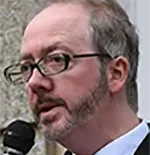 |
| Mark Dixon |
Recent calls from US and UK government politicians for Ukraine to be thankful for military and financial support show a blinkered view because they disregard the existential risk facing Western democracy, and ignore Ukraine’s courage in fighting democracy’s current No. 1 enemy.
At the NATO summit, US national security adviser Jake Sullivan and UK defense secretary Ben Wallace both called for more gratitude from Ukraine, with Wallace saying the UK is not an Amazon for weapons.
Sullivan and Wallace are wrong. Yes, Ukraine has had to fight for its own life, its freedom, and even its existence as a sovereign nation, but it has also been fighting a regime that threatens every value that we outside Ukraine cherish and still enjoy. So, every drop of Ukrainian blood has been shed for global gain.
In such an interdependent situation, who should actually be thanking whom? How do we measure which direction any gratitude should be flowing?
We can answer this by expanding the financial concept of Return on Investment to "Return on Sacrifice". We can consider the sacrifice suffered by Ukraine against its necessity or benefit to the country, and then compare this Return on Sacrifice to the West’s own return on its Ukrainian "investment". By this measure, the West has already seen a very good democracy return for a very modest sacrifice—a Return on Sacrifice no less worthwhile than Ukraine’s.
Alternatively, we could just simply ask who has done more for the other. This leads to the same answer: Ukraine—in tipping the global autocracy-democracy balance in the right direction—has done at least as much for the West as the West has done for Ukraine.
It is true that Ukraine’s motivation for its sacrifice, courage and determination is for survival rather than expressly to help other democratic nations. However, we can likewise say that the West is helping Ukraine so its own values have a higher chance of not being turned to dust. Zelensky is right to stress that Russia is the common enemy of all democratic nations. We should not forget that it is simply because of the way the cards of history have fallen that the responsibility to fight Putin has befallen Ukraine.
The main benefit in considering "balance of gratitude" is to spotlight that Western assistance is not purely altruistic or some sort of charity. If we accept that we are all in this together, there is, in fact, no need for thanks in either direction.
When the history of the 21st century is written—if it happens to be a story that ends with the survival of democracy and freedom for Homo Sapiens—it will be obvious that the nation that surprised the world by standing up to Putin, and helped avert the downward slide of values on the planet, had no need whatsoever to thank anyone.
We should not expect David to thank us while fighting Goliath for the common good.
Moreover, when the trajectory of insufficient support could be the long-term loss of freedom itself, this is not the time to count the beans. We are in a battle that we cannot risk waging by half-measure because it is for our values.
Demanding gratitude both disrespects Ukraine and undermines the message that we are all in the battle together. No civilized person needs to thank another for jointly trying to save civilization. It would be much better for leaders to have the vision to explain why thanks are not due.
***
Mark Dixon founded and runs the Moral Rating Agency, the goal of which is to get companies out of Russia, to get Russia out of Ukraine, and Putin out of Russia. It does this by measuring companies’ involvement with Russia under a standardized rating system and then naming and shaming them till they leave.


 Navigators Global has signed a one-year contract to advise Japan’s embassy on legislation in Congress and White House policies and actions that could affect the US and Japan relationship.
Navigators Global has signed a one-year contract to advise Japan’s embassy on legislation in Congress and White House policies and actions that could affect the US and Japan relationship. Blue Star Strategies is working to boost the US visibility of a Venezuelan opposition political party ahead of the July 28 presidential elections.
Blue Star Strategies is working to boost the US visibility of a Venezuelan opposition political party ahead of the July 28 presidential elections.


 Have a comment? Send it to
Have a comment? Send it to 
Jul. 24, 2023, by Joe Honick
Mark Dixon is running on the moral path. Problem? Russia is not; American and NATO politics may only have just so much patience with the vaguest possibility of Ukraine's winning and the sustained fiscal and military demands and soon get to be clear that Ukraine is the modern version of a more gigantic Lend Lease put forth by FDR almost a hundred years ago for Britain. Add to this the vulgarity of our own political situation, and it's clear the gutsy Ukrainian President has legitimate doubts about his NATO supporters the longer the war lasts. If that support shows the merest crack in upcoming debates and the election, no telling how Putin might really respond, especially after the recent cluster bomb deployment. Add to all this a logical waning of voter support of the tons of billions just to keep things going, with tons more billions on line to repair residential, industrial, commercial and energy Ukraine, the realities could readily return us and the world to another few days of infamy.